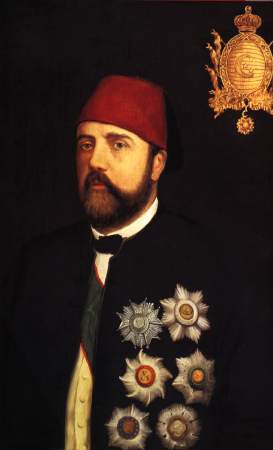Viceroy of Egypt, son of Ibrahim Pasha, born in Cairo in 1830. Sent to France to complete his education, he followed a course of study at the École d’état-major, at the same time as his elder brother, Ahmet Rifaat, and returned to Egypt in 1849.
Some years later, Ismail travelled to Constantinople, where he received the title of Pasha. As long as viceroy Abbas Pasha was still alive, he stayed among the opposition ranks, which made up the so-called party of princes, and remained hostile to the system of government in place at the time.
Following the succession of his uncle, Said Pasha, a leader with extremely progressive ideas (1834), Ismail travelled to France on a mission, coming home via Italy, where he stopped in Rome to present to the Pope, on behalf of the viceroy, a series of magnificent gifts.
On his return to Egypt, he became a member of the state council, and was given charge of the government while Said was away visiting Asia and Europe in 1861. In the same year, he was placed at the head of a body of 14,000 men, a force he used to quell the insurrection launched by the Sudan border tribes. When Said Pasha died in 1863, he was succeeded by Ismail.
The reign of the prince had up until now been marked by few events of any great distinction. Following his succession, Egypt’s cotton trade saw significant growth and soon became one of the country’s main sources of income. Ismail Pasha, at England’s instigation, proved considerably less favourable to the grand project to pierce the Isthmus of Suez than his predecessor, who had done nothing but encourage and promote the idea.
Following negotiations between him and M. de Lesseps, the colossal enterprise came to a halt for a short time and was in danger of being stopped altogether; however, a ruling by the head of the French government allowed the outstanding difficulties to be solved in 1864, and work was completed in full.
Shortly afterwards, Ismail, actively supported by his minister Nubar Pasha, introduced wide-ranging reforms in the political organisation of the country.
In May 1868, he obtained from the Sultan the amendment of the law governing transmission to the throne, which was now to take place by direct line; in December of the same year he formed a kind of parliament responsible for issues relating to tax, reforms in the legal system, irrigation and a wide range of administrative matters, as well as seeking, at the same time, to introduce the municipal system in Alexandria.
On 8 June 1867, Ismail received from the sultan, in place of viceroy, the title of Khedive, and the right to govern, without recourse to approval by Turkey, all matters concerning Egypt’s internal administration and police force. In exchange for these concessions, he had to provide Turkey with a contingent to suppress the Cretan uprising. Completely free to act in his country as he deemed fit, he engaged in a policy of introducing western civilisation to Egypt, taking on French customs and founding a theatre in Cairo, he sought to promote learning, he embarked on negotiations with the courts of Europe with the aim of reforming consular jurisdictions in accordance with the capitulation treaties signed between the East and Europe, dispatched a representative to the monetary conference in Paris, etc.
In 1867, he travelled to France to visit the Universal Exhibition where he appeared in great splendour. When the work of building the Suez Canal was completed, he signed an agreement with the Company modifying certain clauses in the original treaty, notably the one conceding the customs franchise, and resolved to make the inauguration of the canal an occasion of solemn splendour.
To this end he personally visited the principle courts of Europe in May and June 1869 to invite the monarchs to attend the ceremony. However, as a result of the tour, throughout which he was received with much splendour and royal pomp, Turkey was greatly displeased, seeing in the Khedive’s behaviour an attack on its sovereignty. Much irritated, the sultan had his grand vizier dispatch threatening missals to Ismail criticising him for having engaged in negotiations with the courts of Europe, for incurring crippling expenses to the detriment of his people, for purchasing warships, highly sophisticated weapons, etc., and threatened to depose him if he failed to come within the scope of the imperial firmans.
For a short time, it seemed that war might break out, but the conflict soon eased and Ismail was able to carry out the solemn inauguration of the Suez Canal on 20 November 1869. At the beginning of the following year, he agreed, so as to avoid a break with Turkey, to deliver to it his armoured frigates and weapons in return for 13 million. Since this time, the viceroy has been in dispute, which has not yet been settled, with the Suez Canal Company. In 1872, he sent a military expedition to Abyssinia.
Unable to find a solution to rising foreign debt, Ismail was obliged to sell his shares in the Suez Canal company to England. In response, European countries imposed a Franco-British financial control on Ismail. At the time of the nationalist crisis set in train by Arabi Pasha, the Khedive tried to regain his independence. He was deposed by the sultan following a request from London and Paris on 25 June 1879. Ismail withdrew to Istanbul where he died in 1895.


